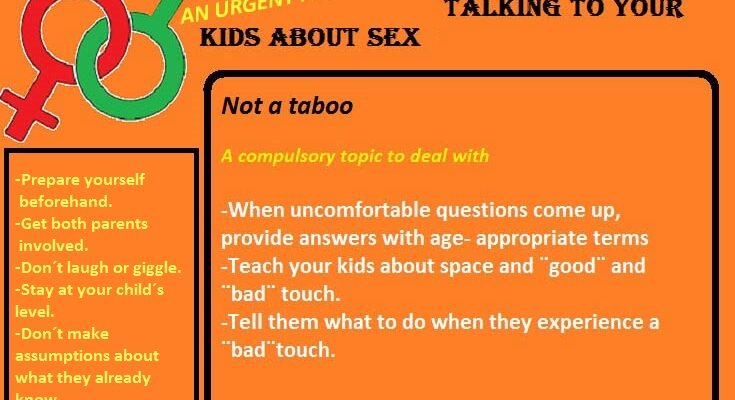Communication with adolescents on the subject of sexuality is recurrent, but there is no need to go over it again. Although it is true that it is necessary to talk to children about the subject from an early age, because it may be too late, parents must be prepared so that this difficult mission is not misunderstood by minors.
According to an article published by the newspaper Granma, a big question arises around the subject that is not at all free: How much truth is there in the fear of mothers and fathers that talking early about sexuality with their daughters and sons will influence their earlier initiation into sex?
In the context of the Let’s Talk about Sexuality: Learning for Life Conference, promoted by the National Center for Sex Education (Cenesex) under the slogan Growing up with Love -from July 11 (World Population Day) to September 28 (International Day of Access to Information)-, Granma talked to Roxanne Castellanos Cabrera, PhD in Psychological Sciences and full professor at the Faculty of Psychology of the University of Havana.
The also clinical psychologist of children and adolescents, and founder of the Respectful Parenting project, was categorical in answering the initial question: “On the contrary, not providing sex education leaves children adrift, unprepared for something that is part of life itself, of their body, of their human relationships, Granma asserted.
To deal with these issues at the appropriate time, it is necessary a lot of observation on the part of parents to choose when to choose in correspondence with the maturity and natural curiosity of each infant; and it is always suggested to start at the pre-school stage.
Castellanos Cabrera suggests: ¨For example, from the age of three, there is a desire for autonomy that should be used productively to teach children to fend for themselves. Just as they learn to eat, to dress themselves, to comb their hair…, they also begin to learn about hygiene and body care.
At the same time, at this age they begin to discover their external body anatomy and to notice the biological differences between the feminine and the masculine; all this is part of an incipient sexual education. Also during early childhood, the specialist suggests, children begin to ask questions about their origins and the fact of looking like mom or dad.
The specialist considers that ¨around the age of five, boys and girls should be prepared to identify all forms of mistreatment, especially child sexual abuse, and to be protected from these unfortunate, but not infrequent situations. It is also a good age to start talking about equal relationships between boys and girls, that they all have the same rights and that they cannot be discriminated against for any reason.
When children go to school, they have evolved mentally and will progressively become more and more capable of understanding more complex content. A process of instruction then begins, scientifically adapted to the periodization of development, in which sex education will also have its own place.
It is also necessary to know that they live in society, and other infants may be the ones who talk to them about topics related to sexuality; therefore, if they have not received notions of sexual education, they will be victims of any inadequate information, and even of certain influences on their behavior.
In short, the environment will inevitably exert some influence, but the better informed they are, the lower the risks of negative influence will be. And both the family and the school play an important role in the timely and correct orientation on the subject in question.
Regarding both poles, the doctor explains that, although the family is the first place where each child receives his or her initial teachings, parents choose what to teach and to what extent, according to their own personal references and experiences.
It is more difficult for families to provide basic notions of sex education from an early age, and then, as they grow older, it tends to become a taboo subject. This indicates the need for families to be prepared to see it as something natural, and to transmit it in the same way.
The school is the second agent of socialization and is an institution through which the State fulfills its function of ensuring the protection of children and adolescents. All educational systems provide instruction on aspects of scientific knowledge, including sex education.
The family and the school must agree on the importance of sex education, and there must be mutual respect for the social responsibility of each party. They should listen to each other and talk about their concerns in this matter.
The school -he considers- should not impose itself, but rather exchange with parents in the face of any discrepancy that may arise, “since it is known that sex education is one of the most complex tasks in the role of teaching, and it is the parents, in the first instance, who are responsible for all their care and education.
If it happens that, for example, the family is affiliated to an interpretation of the world that does not correspond to the school’s explanation, the smartest thing is for children to know how diverse the world is, the explanations that we human beings build on their knowledge and that, even in the field of science, there are different explanations for the same phenomenon.
This will allow children and adolescents to integrate in a flexible way different approaches to the topics to be dealt with, until they choose the theories and explanations that convince them the most.
However, Castellanos believes that little by little progress is being made: “To the extent that many families begin to understand that children are not really so fragile, and that theories and explanations are more convincing to them”.
and that if we educate them in this matter, as in others, we prepare them for life and make them stronger, we are seeing changes in the resistance to address sex education.
resistance to sex education; and as a result, there are more boys and girls being educated in this sense¨.
Trusting that, with a relationship of connection and trust between parents and children, there will be no issues to be discussed. children, there will be no topics that cannot be talked about. Satisfy children’s curiosities and talk to them naturally about this subject as about any other,
will make them come to them when they need it, and thus be able to advise them, and not that they solve by themselves, without the adequate family accompaniment.
(With information from Granma)
Related article
Approaching to an appropriate sex education




